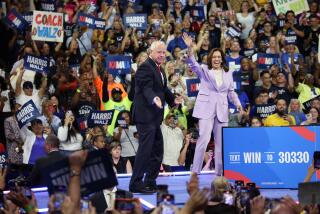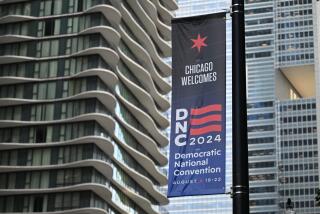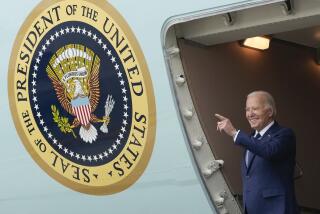Conventions: Not the taxpayers’ party
- Share via
As delegates arrive at the national party convention, supporters of two rival candidates scheme to secure enough votes for the presidential nomination, but at the end of the day the nod goes to a dark horse. That’s the riveting plot of Gore Vidal’s 1960 play”The Best Man,” currently enjoying a revival on Broadway. But it’s a period piece: For more than three decades, presidential nominations have been sewn up before the striking of the first gavel.
Nevertheless, both the Democratic and Republican parties are staging multi-day “nominating” conventions this summer, and taxpayers are picking up part of the tab. That would change under a measure recently approved by a 95-4 vote in the Senate. (Sen. Dianne Feinstein voted yes; Sen. Barbara Boxer voted no.) Sen. Tom Coburn (R-Okla.), the author of the amendment to the Senate’s farm bill, argued that taxpayers shouldn’t be funding a “hallelujah party” for either Democrats or Republicans.
We agree. It’s true that the $18.4 million each convention will receive for expenses comes from a pool of funds created by the decision of some taxpayers to designate $3 of their income taxes to the Presidential Election Campaign Fund. (Whether taxpayers realize their contributions underwrite conventions as well as candidates is another question.) But every dollar not spent on what has become a substanceless media event is a dollar that could be spent on something else.
COMMENTARY AND ANALYSIS: Presidential Election 2012
More to the point, the subsidy hasn’t prevented the evil it was designed to curb: special-interest funding for convention-related activities that might put the parties and their nominees in the donors’ debt. Although the parties themselves may spend only what they receive from the U.S. Treasury, local “host committees” can solicit private funds. The committee for this year’s Democratic convention in Charlotte, N.C., has set a fundraising goal of almost $37 million; Republicans hope to raise $55 million.
Supporters of campaign spending reform argue that Congress should revisit public financing of conventions as part of a larger reappraisal of public funding of elections. That probably won’t occur until after the November election, for which neither President Obama nor Mitt Romney are accepting public funds. A proposed bipartisan Presidential Funding Act, in addition to eliminating public funding for conventions, would increase matching funds for candidates and enhance the role of smaller donors by providing a 4-1 match for contributions of $200 or less. It would not, however, impose spending limits on campaigns, the traditional quid pro quo for public funding — a problematic compromise.
It’s unclear whether, in the world of Citizens United and “super PACs,” public financing of presidential candidates has a future. But certainly the time has come for the public to stop funding “hallelujah parties.”
More to Read
A cure for the common opinion
Get thought-provoking perspectives with our weekly newsletter.
You may occasionally receive promotional content from the Los Angeles Times.










